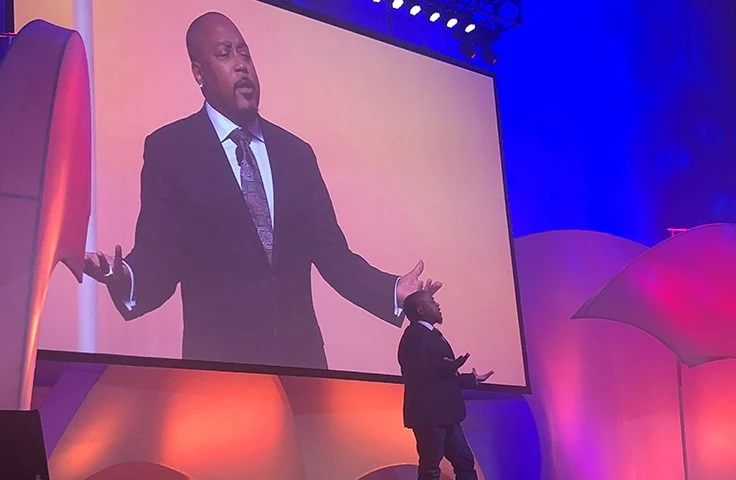
One of the most highly anticipated keynotes of the three presented at the 2018 IGC Show in Chicago’s Navy Pier was the address delivered by Daymond John, “Shark Tank” co-star, business mentor and founder of apparel brand FUBU. Set to a soundtrack of famous soul and hip-hop hits, John talked about his background growing up in Queens, N.Y., and explained his 5 S.H.A.R.K. Points for Success in business and in life: Set a goal, do your Homework, Amor, Remember, you are the brand, and Keep swimming.
He kicked off his address by first giving kudos to the independent garden center leaders in the room, noting that the smaller, specialty clothing stores were the only businesses willing to take a chance with his FUBU clothing line when it first launched.
John’s talk was both deeply personal and professional, and he talked about how his entrepreneurial spirit can be traced back to when he was 6 years old. He started a business as a first grader, painting pencils with “the prettiest girls in school’s” names on them, thinking he could sell them to the boys, who could in turn gift them to the girls. The guys didn’t go for it – but the girls did – and they were willing to pay twice as much for the same product, which was one of his first lessons in business.
When he was 10, his parents got divorced and his dad left. He hasn’t seen him since. His mom worked three jobs, and that work ethic stuck with John. As he entered adolescence, hip-hop was emerging on the music scene, and many of the top artists happened to live nearby in the Hollis neighborhood of Queens.
“People were making money doing something they love,” John observed, and that resonated with him.
He also admired the small business owners and entrepreneurs he worked with at some of his early jobs at the mall. “They thanked everybody for their success and blamed themselves for their failure,” he recalls.
S.H.A.R.K. Point #1: Set a goal
Observing his mother, small business owners and hip-hop artists inspired him to think about what he wanted out of a career. He knew he didn’t have the creative talent required to sing, rap or dance, but he wanted to be involved in hip-hop somehow and do something he loved. During the time, major brands were rejecting hip-hop culture, stereotyping the artists who wore their clothing, and that’s when John had an idea and set his goal.
“I want to make a uniform for this community,” he said during his keynote address.
Key takeaway for IGCs: He realized that hip-hop was more than just music, it was a lifestyle, and he wanted to celebrate that. “You can’t hit a target you can’t see. If you’re not in charge of the goals you set, you let other people set them for you.”
He started small – selling hats outside of the mall in 1989 – and then moved on to FUBU-branded t-shirts, making less than a dozen at first. He didn’t have the money or capital for mass production or advertising, so he “stalked” teams producing music videos and convinced artists, including Will Smith, to wear his clothing while performing. He spray-painted security gates all over New York City “authorized FUBU dealer” and convinced LL Cool J, who also lived in Hollis, Queens, to be their spokesperson.
S.H.A.R.K. Point #2: do your Homework
His “stalking” paid off, and it got him to the point where he could afford to do his homework – attending apparel trade shows, researching what other brands were doing and networking with buyers. However, he still couldn’t get into expensive trade shows yet – so he set up a hotel room and created his own booth of sorts, and invited people to check out his merchandise. He wrote $300,000 worth of orders at one early show, but still didn’t have the production facilities or team established to fill those orders. Thanks to his mom, who believed in him and took out a $100,000 mortgage on her home, he was able to purchase industrial sewing machines and craft the clothing from a workshop set up at her house.
S.H.A.R.K. Point #3: Amor
All of that work took passion, belief, and especially amor. “I loved what I was doing,” John says. “I would dress people for free.” At first, he didn’t do it for the money, but as FUBU became more successful, he got lost in the fame and fortune he had worked so hard to achieve, and lost sight of his priorities, including his family. Eventually, his ex-wife filed for divorce, and he lost the company he had started out of his mother’s home, he said.
S.H.A.R.K. Point #4: Remember, you are the brand
This goes beyond public image, John says. It’s about taking care of yourself and your family, too. He reevaluated what success was several times in his life, including after his divorce, after he was diagnosed with cancer and when he spent time with his children. Success, to him, was that he was going to be around for his family, and that meant focusing on his health.
Key takeaway for garden centers: “We take care of everybody else, but we don’t take care of ourselves,” John says of business owners. “Take care of yourself.”
S.H.A.R.K. Point #5: keep Swimming
Despite all of the obstacles John experienced, he “kept swimming.” After he lost everything, he was able to rebuild his career and use his talents to help other entrepreneurs through his role on “Shark Tank.”
Watch for more highlights from the 2018 IGC Show soon.
Latest from Garden Center
- De Vroomen Garden Products unveils Miffy Gardening Collection for kids
- Pennsylvania Horticultural Society announces 2025 Gold Medal Plant winners
- GIE Media Horticulture Group wins five regional 2025 Azbee Awards of Excellence
- Terra Nova Nurseries introduces rust-free and disease-resistant heucherella
- John T. Nickel, founder of Greenleaf Nursery Co., passes away at 89
- Garden Media Group announces sixth annual Women in Horticulture Week
- Star Roses and Plants announces National Knock Out Rose Day
- The Growth Industry Episode 4: How federal budget cuts are affecting horticulture nonprofits





